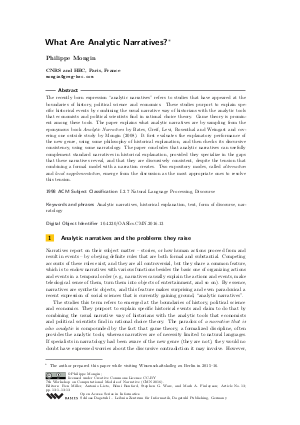What Are Analytic Narratives?
Author Philippe Mongin
-
Part of:
Volume:
7th Workshop on Computational Models of Narrative (CMN 2016)
Part of: Series: Open Access Series in Informatics (OASIcs) - License:
 Creative Commons Attribution 3.0 Unported license
Creative Commons Attribution 3.0 Unported license
- Publication Date: 2016-10-25
File

PDF
OASIcs.CMN.2016.13.pdf
- Filesize: 386 kB
- 13 pages
Document Identifiers
Subject Classification
Keywords
- Analytic narratives
- historical explanation
- text
- form of discourse
- narratology
Metrics
- Access Statistics
-
Total Accesses (updated on a weekly basis)
0Document
0Metadata
Abstract
The recently born expression "analytic narratives" refers to studies that have appeared at the boundaries of history, political science and economics. These studies purport to explain specific historical events by combining the usual narrative way of historians with the analytic tools that economists and political scientists find in rational choice theory. Game theory is prominent among these tools. The paper explains what analytic narratives are by sampling from the eponymous book Analytic Narratives by Bates, Greif, Levi, Rosenthal and Weingast and covering one outside study by Mongin (2008). It first evaluates the explanatory performance of the new genre, using some philosophy of historical explanation, and then checks its discursive consistency, using some narratology. The paper concludes that analytic narratives can usefully complement standard narratives in historical explanation, provided they specialize in the gaps that these narratives reveal, and that they are discursively consistent, despite the tension that combining a formal model with a narration creates. Two expository modes, called alternation and local supplementation, emerge from the discussion as the most appropriate ones to resolve this tension.
Cite As Get BibTex
Philippe Mongin. What Are Analytic Narratives?. In 7th Workshop on Computational Models of Narrative (CMN 2016). Open Access Series in Informatics (OASIcs), Volume 53, pp. 13:1-13:13, Schloss Dagstuhl – Leibniz-Zentrum für Informatik (2016)
https://doi.org/10.4230/OASIcs.CMN.2016.13
BibTex
@InProceedings{mongin:OASIcs.CMN.2016.13,
author = {Mongin, Philippe},
title = {{What Are Analytic Narratives?}},
booktitle = {7th Workshop on Computational Models of Narrative (CMN 2016)},
pages = {13:1--13:13},
series = {Open Access Series in Informatics (OASIcs)},
ISBN = {978-3-95977-020-0},
ISSN = {2190-6807},
year = {2016},
volume = {53},
editor = {Miller, Ben and Lieto, Antonio and Ronfard, R\'{e}mi and Ware, Stephen G. and Finlayson, Mark A.},
publisher = {Schloss Dagstuhl -- Leibniz-Zentrum f{\"u}r Informatik},
address = {Dagstuhl, Germany},
URL = {https://drops.dagstuhl.de/entities/document/10.4230/OASIcs.CMN.2016.13},
URN = {urn:nbn:de:0030-drops-67141},
doi = {10.4230/OASIcs.CMN.2016.13},
annote = {Keywords: Analytic narratives, historical explanation, text, form of discourse, narratology}
}
